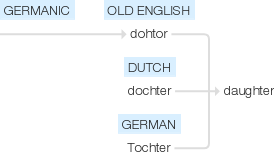Daughter
Old English dohtor, of Germanic origin; related to Dutch dochter and German Tochter, from an Indo-European root shared by Greek thugatēr .
wiktionary
From Middle English doughter, doghter, from Old English dohtor(“daughter”), from Proto-West Germanic *dohter, from Proto-Germanic *duhtēr, from Proto-Indo-European *dʰugh₂tḗr.
etymonline
daughter (n.)
Middle English doughter, from Old English dohtor "female child considered with reference to her parents," from Proto-Germanic *dokhter, earlier *dhutēr (source also of Old Saxon dohtar, Old Norse dóttir, Old Frisian and Dutch dochter, German Tochter, Gothic dauhtar), from PIE *dhugheter (source also of Sanskrit duhitar-, Avestan dugeda-, Armenian dustr, Old Church Slavonic dušti, Lithuanian duktė, Greek thygater). The common Indo-European word, lost in Celtic and Latin (Latin filia "daughter" is fem. of filius "son").
The modern spelling evolved 16c. in southern England. In late Old English also "woman viewed in some analogous relationship" (to her native country, church, culture, etc.). From c. 1200 of anything regarded as feminine, considered with respect to its source. Daughter-in-law is attested from late 14c. Related: Daughterly.
